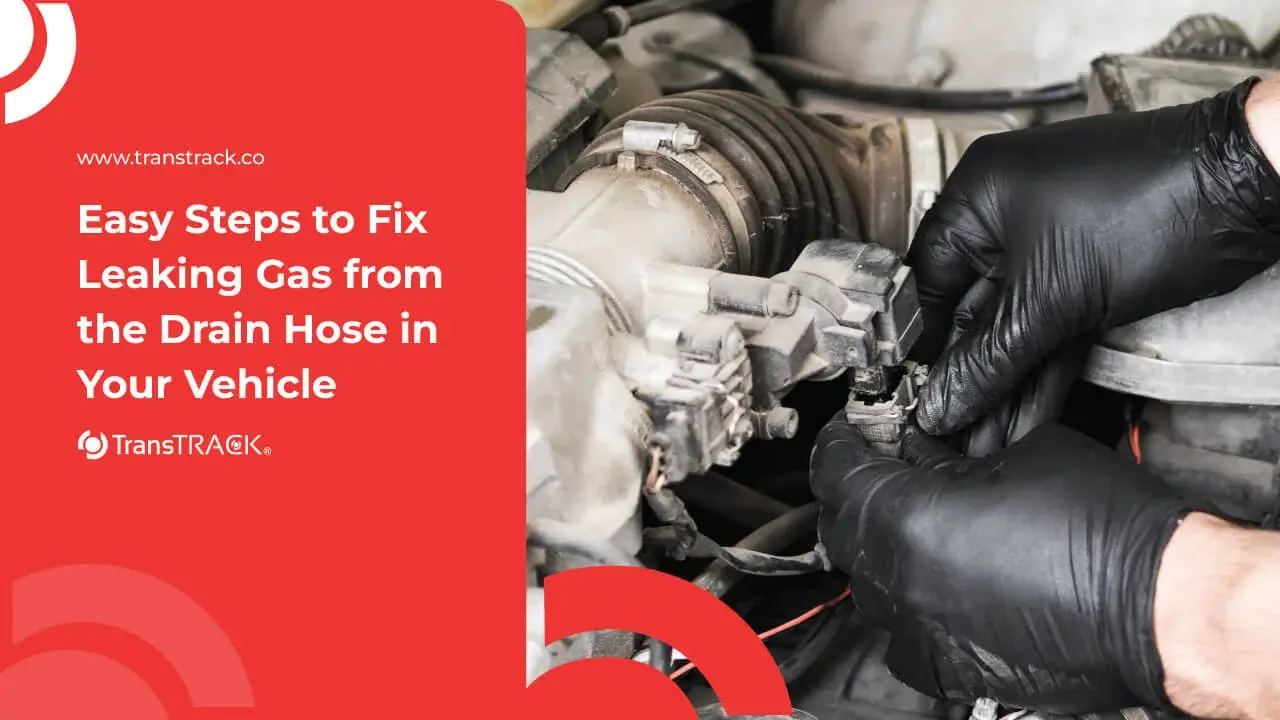Easy Steps to Fix Leaking Gas from the Drain Hose in Your Vehicle
Posted on March 7, 2025 by Nur Wachda Mihmidati

Gasoline leaking from the exhaust hose is a problem that should not be ignored. Apart from the risk of causing a fire, these leaks can also damage vehicle components and inefficiently increase fuel consumption. Therefore, it is important for vehicle owners to understand the causes of leaks, how to resolve them, as well as preventive measures to keep the vehicle safe and optimized. In this article, we will discuss the best solutions for gasoline leaks and how technologies such as the Vehicle Maintenance System from TransTRACK can help in maintaining vehicles more effectively.
What are the causes of gasoline leaking from the drain hose?
The cause of gasoline leaking from the drain hose can be caused by the following factors:
- Worn or cracked fuel hose – Hoses that are old or exposed to excessive heat can become cracked or brittle, causing fuel leaks.
- Loose clamps or connections – Connections that are not tight can cause gasoline to seep out of the fuel system.
- Too high fuel pressure – If the fuel pressure exceeds the capacity of the hose or other components, a leak may occur.
- Rust or corrosion in the fuel system – Rust in components such as the fuel tank or pipes can cause leaks.
- Malfunction of the fuel pump or fuel injector – If the fuel pump malfunctions or the injector leaks, fuel may escape through an improper channel.
If gasoline leakage occurs, have it inspected and repaired immediately to avoid the risk of fire or further damage.
Why is gasoline leakage from the drain hose dangerous?
Gasoline leaks from the drain hose are extremely dangerous for the following reasons:
- Risk of Fire and Explosion. Gasoline is a highly flammable material. A leak exposed to sparks, engine heat, or an electrical short circuit can cause a fire or even an explosion.
- Gasoline vapors contain toxic compounds that can cause dizziness, nausea, headaches, or even poisoning if inhaled in large amounts in an enclosed space.
- Gasoline leaks can damage vehicle components, especially if it hits electrical parts or other systems not designed for contact with fuel.
- Environmental Impact Gasoline spills can pollute soil and water, damage ecosystems, and harm nearby living creatures.
- Leaks cause fuel waste, increase vehicle operating costs, and reduce engine efficiency.
In the event of a gasoline leak, immediately turn off the engine, avoid sources of ignition, and make repairs as soon as possible to prevent further harm.
Signs of a gasoline leak in a vehicle
Here are the signs of a gasoline leak in a vehicle to look out for:
1. Strong Gasoline Odor
If you smell a strong gasoline odor, especially around the vehicle or inside the cabin, it could be an indication of a fuel leak.
2. Gasoline Puddles or Stains
Check under the vehicle, especially after it has been parked for a long time. If there are golden or brownish puddles or stains with the smell of gasoline, there may be a leak.
3. Fuel Consumption Increases Drastically
If the fuel runs out quickly even though the vehicle’s usage pattern has not changed, there could be a leak that causes gasoline to be wasted.
4. Engine Difficulty Starting or Unstable Running
Gasoline leaks can cause unstable fuel pressure, making it difficult for the engine to start or have problems running.
5. Excessive Smoke from the Exhaust
If the leak affects the combustion system, the exhaust may emit more smoke than usual, often black in color.
6. “Check Engine” Indicator Illuminated
In modern vehicles, fuel leaks can be detected by sensors that cause the engine warning light to come on on the dashboard.
7. Hissing Sound Near the Fuel Tank or Hose
If there is a leak in the hose or connection, a hissing sound may be heard due to gasoline leaking under pressure.
If you experience these signs, have the vehicle inspected and repaired immediately to prevent further risks such as fire or engine damage.
How to Fix Gasoline Leaking from the Drain Hose
There are several ways to fix gasoline leaking from the drain hose. Here’s how to fix it:
1. Preliminary Steps to Take
Before carrying out repairs, take the following precautions to avoid the risk of fire or injury:
- Turn off the engine and keep away from fire sources
- Make sure the vehicle is turned off and there are no nearby sources of fire, such as cigarettes, electric sparks, or excessive heat.
- Identify the source of the gasoline leak
- Check the area around the drain hose and fuel system for leaks.
- Use protective equipment such as gloves and masks
- Gasoline contains toxic substances, so use chemical-resistant gloves and a mask to avoid direct contact or inhaling gasoline vapors.
2. Leak Repair Based on the Cause
a. If the Fuel Hose is Cracked or Damaged
- Replace the fuel hose with a new one, making sure it matches the vehicle specifications.
- Ensure that the hose is properly installed and that there are no leaks after replacement.
b. If the Hose Connection is Loose
- Retighten the hose clamp or connection using a suitable screwdriver or key.
- If the clamp is worn or damaged, replace it with a new one.
c. If the fuel pressure is too high
- Check and ensure that the fuel pressure regulator is functioning properly.
- If the regulator is damaged, replace it with a new one according to vehicle specifications.
d. If the Fuel Pump or Injector is Damaged
- Check the fuel pump and injector to ensure there are no leaks.
- If the fuel pump is leaking or malfunctioning, replace it with a new one.
- If the fuel injector is leaking, have it serviced or replaced as required.
3. Post-repair check
- Start the engine and check if there are any leaks.
- Make sure all fuel components are properly installed and there is no suspicious smell of gasoline.
- Test the vehicle carefully to ensure the fuel system is working optimally.
If the leak cannot be resolved on your own, take the vehicle to a professional repair shop immediately for further inspection.
How to Prevent a Gasoline Leak in the Exhaust Hose
To keep your vehicle safe and avoid gasoline leaks, take the following preventive measures:
1. Perform Regular Checks on the Fuel System
- Check the fuel hoses, tank, and other components regularly to ensure there are no leaks or cracks.
- Make sure there are no signs of wear or damage to hoses and connections.
2. Use Quality Fuel to Avoid Dirt Deposition
- Low-quality fuel can cause dirt to build up in the fuel system, which can damage hoses and other components.
- Choose fuel with an octane that matches the vehicle specifications.
3. Avoid Using Out-of-Specification Fuel Hoses
- Use fuel hoses recommended by the vehicle manufacturer to ensure pressure and chemical resistance.
- Avoid using aftermarket hoses that do not meet safety standards.
4. Check Clamps and Connections Periodically
- Make sure the fuel hose clamps and connections are tight and there are no leaks.
- If the clamps are loose or corroded, replace them with new ones immediately.
5. Replace Parts That Begin to Show Signs of Wear Immediately
- If the fuel hose starts to harden, crack, or leak, replace it immediately.
- Other components such as the fuel pump and injector also need to be checked and replaced if damaged.
With regular maintenance and the use of quality components, the risk of gasoline leaks can be minimized, making the vehicle safer and more fuel efficient.
Gasoline leakage from the exhaust hose is a serious problem that can compromise safety, damage the vehicle, and cause fuel wastage. Therefore, it is important to promptly identify and repair leaks and take preventive measures so that similar problems do not occur in the future.

To ensure that your vehicle’s fuel system is always in optimal condition, use TransTRACK’s Vehicle Maintenance System. With this system, you can monitor your vehicle’s condition in real-time, get periodic maintenance notifications, and avoid the risk of damage due to negligent maintenance. Keep your vehicle safe and efficient with the best solution from TransTRACK!
Topic :
 Bahasa Indonesia
Bahasa Indonesia









